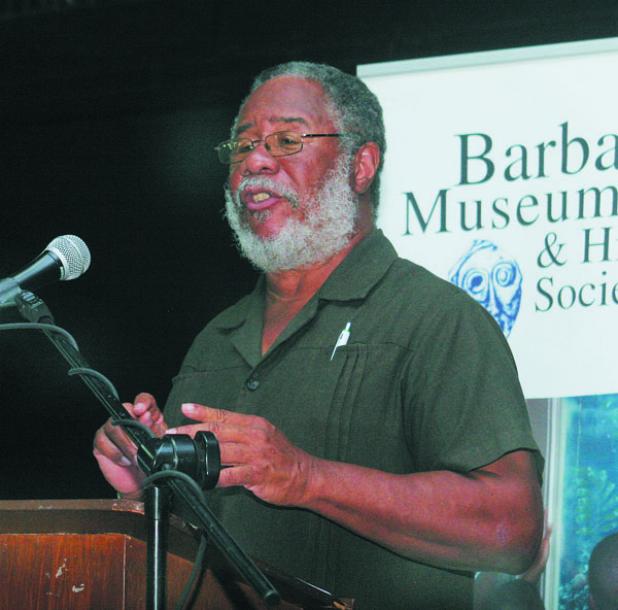
Professor Pedro Welch delivering the Barbados Museum and Historical Society 2016 Lecture Series.
Exploring the evolution of B’dian identity
PROFESSOR Pedro Welch recently explored the historical factors that contributed to the making of a Barbadian Identity, in the period between the settlement of Barbados in the 1620's, and the third quarter of the 19th century.
He was at the time delivering the second instalment in the Barbados Museum and Historical Society 2016 Lecture Series, Becoming Bajan: The Evolution of Barbadian Identity, held in collaboration with the University of the West Indies’ Department of History and Philosophy, and the National Cultural Foundation.
Speaking on the topic “The Making of Bimshire/ Little England: Perceptions of Special Status in the Colonial Hierarchy/ Framework”, Professor Welch paid special attention to the cultural and legal issues which permitted British citizens overseas to consider themselves as “transplanted” citizens.
The former Deputy Principal of University of the West Indies, Cave Hill Campus and Dean, Faculty of Humanities and Education, noted the emergence of a political culture that sought to establish a relative autonomy from the colonial overlords, and traced the export of an Anglicanism that contributed to a local government system (the vestry), which added its own flavour to an emerging colonial Barbadian identity.
“The Church represented more than religious ritual, it was also deeply embedded in the political system, particularly the local government system centred in the Vestry.
“The Vestry system was not just a matter of church government, it was also quite closely aligned to the other elements of the political system that developed and emerged within the colonies. The Vestry then was not only an ecclesiastical institution, it was also a civil institution that looked after some areas of life in Barbados,” he told the audience gathered at Queen’s Park Steel Shed.
As it relates to the term “Little England”, Professor Welch said it emerged over time as an expression of the island’s success, when compared to the rest of the Caribbean.
“True, that success related more to the privileges of a Euro-Barbados society fully aware of its endemic over the Afro-Barbadian majority, but it cannot be denied to an outsider unacquainted with the social realities that Barbados was a resounding success – small, with an economy built on monoculture, but still providing for its agro-capitalists a measure of comfortable living.
“Could Afro-Barbadians buy into that perception? The answer is simply that while the reality of the endemicity of the plantation was a limited factor on the social advances of the masses, some of the neighbouring classes could and did come to see the island as home, and possibly the best home in the region.”
He went on to note that Bimshire is an amalgam of two separate terms, explaining that “shire” is a term used in England to refer to a division of land, which can traced back to an old English term “Scir”, and is synonymous with what is often termed as a county. Whereas “Bim”, he said, is identified as also having a strong association with an Igbo term which meant, among such other things, “my house”, “my home”, “folk”, “my fellows”, etc.
“There was a strong presence of Igbo slaves in early Barbados, which is attested by the survival of the Igbo 2nd person plural pronoun ‘una’ (wunna) in present-day Barbados folk-speech. The emphatic signalling among these groupings of Igbos would have spread easily to other Africa slaves, and might also have been reinforced…
“Household contacts through nurses etc., would have spread the term effectively to White usage, thus producing the derivative Bimshire, a colonial English name for Barbados.”
He further pointed out, “The term ‘Little England/ Bimshire’ are of different origins. The first being different illusion to Barbados’ role as a premier English colony in the Caribbean for much of its post-settlement existence; bimshire being an African derived term that was adopted by creole whites to signify a sense of place and a sense of special status in the colonial hierarchy.” (TL)
